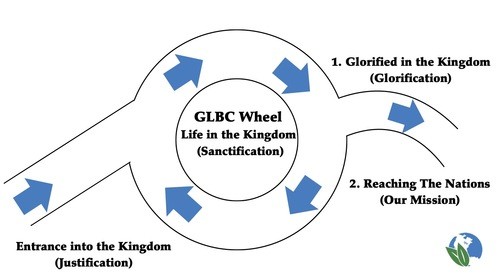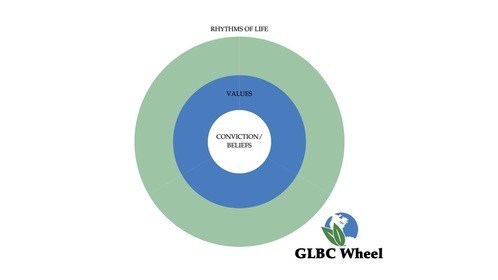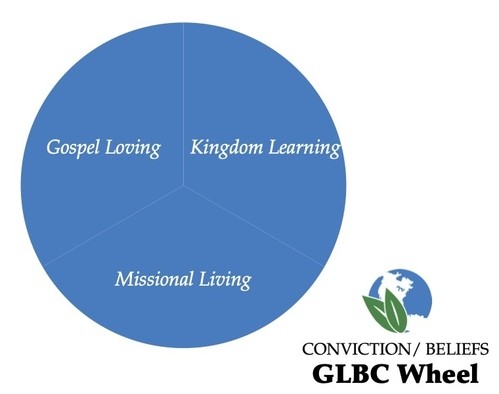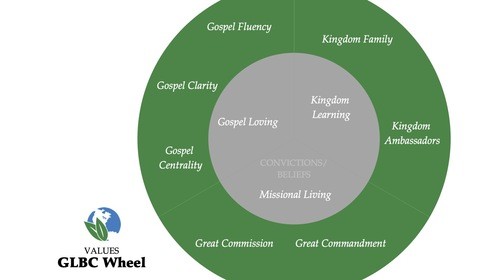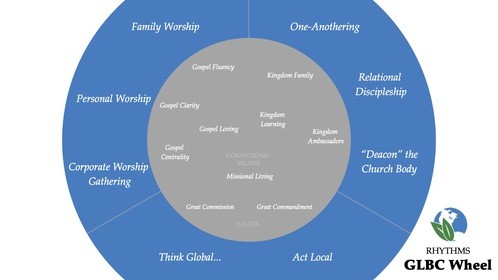The Christian life will value many things, and our list is nowhere near exhaustive. Yet we want to emphasize Springing forth from our convictions, we value seven particular things at GLBC.
Gospel Centrality – We desire to have the gospel at the center of all that we do as a church. The center of a church is her worship before the Triune God of Heaven. The message of the cross is actually the power of God to the sinner (1 Corinthians 1:18). The person on whom God has set His love on from before time existed (Ephesians 1:5) is “being saved” by the preached Word of the cross. Now that word for “being saved” is what is described here as a “Divine Passive.” That is fancy language for the fact that this is something God is doing in the life of the believer. This includes declaring the Christian righteous in Christ. This includes setting them apart unto Himself. This also includes the whole process of sanctification. The process of God transforming them completely into the image of Christ. This is God’s activity. He is doing it in us.
Gospel Clarity – It is through the CLEAR preaching of the gospel that God delights to save those who believe. He delights to save sinners through this message of Jesus Christ crucified in the place of sinners. He delights to save sinners by declaring guilty sinners as righteous through the great exchange of His Son. Jesus will be regarded as a stumbling block for those hungry for political power. Jesus will be regarded as foolishness for those who are wanting a prim and proper Savior. For those wanting a “knight in shining armor” they will be disappointed by the dingy and blood-soaked robes of the Savior. He is pleased that you bring your nothing to Him. He is pleased that you bring your emptiness. He is pleased to take the foolish things of this world and make them lovely in His Son. He is pleased to save those who believe in Jesus.
Gospel Fluency – The word fluency is often used when learning a foreign language and it describes one’s ability to speak a language. We talk of people being fluent in English or fluent in Spanish. At Gospel Life we value Gospel Fluency the ability to speak the gospel into every area of life. As we speak the truth of the gospel into every area of our lives and one another’s life, we mature by the Holy Spirit into Christlikeness.
Kingdom Family (Faith Family) – We value the Kingdom-family that Christ has purchased. A Kingdom-family is first the recognition that we have been purchased from the domain of darkness and brought into the adopted family of God (Colossians 1:13-14). Jesus identified Himself with His church in a way that when she is persecuted, He is persecuted (see Acts 9:4). We believe that we ought to grow in learning to be a Kingdom-family in this world. This does not come natural to us but is something we grow in by the Spirit. As we’re connected to Jesus Christ, we are thus in fellowship with one-another and we value this Kingdom-family that God is uniting to Himself in Christ.
Kingdom of Ambassadors – We value Kingdom ambassadors that appeal to outsiders. Ambassadors are those who appeal on behalf of a nation in an embassy. The United States of America has an embassy in almost every nation around the world. These embassies represent the interests of America in that nation and enacts what the United States demands of them on foreign soil. Our churches are like embassies in a foreign land. This makes each member then are like ambassadors for our “homeland” and on behalf of our King. We appeal to outsider, one another, and the place we find ourselves; “Be reconciled to God in Christ!”
Great Commission – Jesus has commissioned us in Matthew 28:16-20 to take His “good news” to every nation. The Lion from the Tribe of Judah, that is the ruler with strength, courage, and boldness has conquered. But He conquered through His shed blood for sinners. As Isaiah says, “like a lamb that is led to the slaughter, and like a sheep that before its shearers is silent, so he opened not his mouth” (Isaiah 53:7). The Lamb of God has conquered by bearing the sins of His people and giving them His righteousness. We are called to value this great commission to the ends of the earth. “Worthy are you to take the scroll and to open its seals, for you were slain, and by your blood you ransomed people for God from every tribe and language and people and nation, and you have made them a kingdom and priests to our God, and they shall reign on the earth.” (Revelation 5:9-10)
Great Commandment – We value the Great Commandments as the melody of our orders. The melody of the orders Jesus gave was to Love God and Love People (Matthew 22:37-40). These commandments govern how we think of being witnesses in the communities that God has providentially placed us.
We never want to assume that our values will produce a limited number of rhythms and practices in the life of the Christian since all of life is under Christ. Yet as a church we feel there are eight rhythms we feel should be incorporated in every member of GLBC.
Corporate Worship Gathering – The spoken message of the cross requires the declaration of that message. It is through a means of a herald (one who proclaims “good news”). Paul says to the Galatians that, “It was before your eyes that Jesus Christ was publicly portrayed as crucified” (Galatians 3:1). The Galatians never witnessed the crucifixion of Jesus. Paul is either exaggerating, or he is arguing that his preaching was so evident of the crucifixion of Christ, that they could be called “eyewitnesses.” Preaching so clearly presents Christ crucify that people can be said to have seen the Lord Jesus on the cross. The Christian bears the marks of the Son of God in their repentance from sin. In their being “cut to the heart” or “undone” (Acts 2:37) from the Word of God preached, they bear the marks of the Son of God. Their lives become a “fragrance from life to life” because they are actually being transformed into the image of Christ (2 Corinthians 2:15-17).
Personal Worship – In one sense, all people have been called in the gospel because it goes out to everyone without distinction. But it is through the effectual call of the gospel that some people come to a saving knowledge of Christ. There is an effectiveness to the call of the gospel that actually changes hearts. Effectual calling then is the Work of God’s Spirit to convict of us our sin and misery. Effectual calling also is the Work of God’s Spirit to enlighten our eyes to Christ. Humans generally resist the calling of God in an outward sense all the time. But a Christian is one who begins to be called in the gospel with the conviction of their sin. A Christian is one who has been called, and their minds have been enlightened to the gospel. This means through various ministries like Discipleship groups, we pursue our personal growth in Christlikeness.
Family Worship – It has often been observed that one of the fruits of the Reformation was the reinstitution of family worship. For many of us, we don’t even have categories for family worship because we’ve never grown up with it. At Gospel Life, we pursue the rhythm of family worship by joining together in the worship of God in Christ on a regular basis led fathers. Father’s leading their family in prayer, Bible reading, and singing is a critical element of worship as our church body. This emphasis can be seen by including children in the worship gathering. We believe that God has called all to come and worship Him, not just those we think are “capable” to do so. This emphasis is also seen in the way we advocate for parental involvement in the life of your children. God will hold parents responsible in the spiritual instruction of your children and we want to join you in that. This emphasis is also seen in the way we seek to equip parents in the amazing and (at times) terrifying task. “As goes the home, so goes the church, so goes the nation. Family worship is a most decisive factor in how the home goes.” –Joel Beeke
One-Anothering – The kingdom of God is not something that comes natural to us. It is actually radically foreign to us in our flesh. This is why Paul can say that they have “learned Christ!” (Ephesians 4:20). It was a past learning with a present and ongoing learning. Every one of the commands in Ephesians 4:25-32 require community–one-another. We use the language around here of “one-anothering” because it embodies the wide sweeping demands of the New Testament. The stewardship of the body of Christ to each other is multifaceted and thus requires a broad sweeping rhythm to capture all that God demands of His body.
Relational Discipleship – Part of learning to walk by the Spirit is walking close with other believers. Learning to speak the truths of the gospel into each other’s lives, and having others speak into our lives. We focus on relational discipleship because it is Jesus’ model for discipleship and it’s how the church thrives. An example will suffice to show why we focus so drastically on this. Picture an evangelist going out and winning 1,000 people to Christ every day for a whole year. We would all be blown away! But then compare that to a person who faithfully evangelized and discipled two people in a year. The evangelist continues to win people for Christ, whereas the disciple-maker focuses on slow growth. Over time, the disciple maker ends up impacting far more people with a far greater depth. He focuses on steady, consistent, multiplication and teaching the disciples to do the same.
“Deacon” the Church Body – The word for “deacon” in the NT means to “serve” All believers are first served by God in Christ through the Holy Spirit, “For even the Son of Man came not to be served (deaconed) but to serve (deacon), and to give his life as a ransom for many” (Mark 10:45, with emphasis). Jesus has given His Life for Me. This forms within the hearts of all believers, “My life for yours.” As we serve the body of Christ, we grow into the kind of people God has remade us to be (Ephesians 4:32).
There is a sign in the basement at GLBC which has always encapsulated the last two rhythms. "Missions: Think global, act local.” This simple statement captures what we believe the Bible describes about missions.
Think global… – We think global by focusing on prayer, giving, and sending for the nations as a rhythm of grace. We want the practice of praying for unreached people groups. Giving to missionaries who have gone out for Jesus’ sake (3 John 7). Sending our own missionaries and partnering with other local churches to send missionaries.
Act Local – The second half of that statement, “Act Local” requires us to do more than just think about missions. We want to participate as missionaries in our own local context. We act local by focusing on personal evangelism and loving our city as a rhythm of grace. There is a sign in our basement that I used to regard as tacky, but I’ve grown to love. In the middle of our missionary wall downstairs, there is a sign with peeling letters that says: “Our missionary to the Keyser area.” I love it. It reminds me every time I walk past it that God has not just called us to go to the nations, but to love the community in which he has placed each and every one of us. The city of God truly resurrects the city of men. It doesn’t happen fully.
